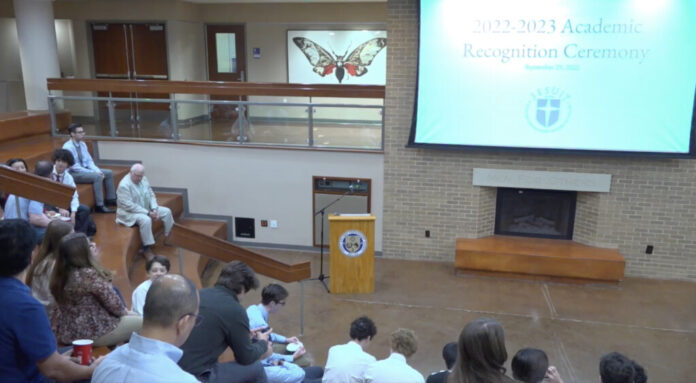As the students, turn by turn, quickly walked down the stairs to receive their certificates, they remained standing at the center of the hall, lining up side-by-side as they patiently waited for all to accept their well-deserved awards. As the final student dashed down the stairs, all of the standing scholars were greeted by deafening applause, parents and students alike congratulating them for their hard work and sure-to-be future achievements. At the Academic Recognition Ceremony on September 29th, numerous seniors and juniors receive awards pertaining to the PSAT standardized testing and AP tests over the past few years.
Jonah Timmons ’23, “Being named a national merit scholar was an honor. It was a culmination of all the hard work and sacrifices I put in to prepare. I was overjoyed to be recognized in front of family and friends at the ceremony.”
AP
Starting in the 1950s, AP, or Advanced Placement, courses challenged high schoolers as they participated in college-level courses, ranging from STEM subjects such as AP BC Calculus and AP Physics C to the humanities, including AP Language and Composition and AP Comparative Government and Politics. In addition, Collegeboard, the creator of AP courses, provide some electric courses as well: AP Art and Design Program, AP Art History, and AP Music Theory. At the end of the semester, students take the AP exam for that course, a difficult exam that covers material from the entire year or semester, depending on the course length. The scores for the tests range from 1 to 5, with 5 being the highest.
To receive the AP Scholar award, students must score 3 or higher on 3 or more AP exams.
To receive the AP Scholar with Honor award, students must score an average of at least 3.25 and have scored at least 3 or higher on four or more AP exams.
To receive the AP Scholar with Distinction award, students must receive an average score of at least 3.5, having scored at least a 3 on five or more AP exams.
Jack Betz ’23 “Being recognized for your accomplishments and hard work is always a great feeling.”
PSAT
African American, Hispanic, and Indigenous Recognition Programs
Each year, the College Board’s National Recognition Program recognizes the efforts of often underrepresented students, awarding them for their hard work. To be eligible, along with having a GPA of 3.5 or higher, they must score in the top 10% on the PSAT/NMSQT. This academic honor can help these respective students connect with institutions around the country as their achievement in the nationally-recognized PSAT stands out from the crowd.
Commended Scholars
Out of the 50,000 highest PSAT/NMSQT scorers in the entire nation, approximately 34,000 of them become Commended Scholars, recognized for their outstanding achievements.
Semifinalists
The top 16,000 of the 50,000 highest PSAT/NMSQT scorers become Semifinalists, who can then apply to become a Finalist. Once they become Finalists, they receive wider access to scholarships, ranging from those of colleges to corporations to scholarships from the National Merit Program itself.
Responses
After the ceremony, a few attendees were asked how they felt about the ceremony, a ceremony which represents all their hard work and dedication over the past few years.
Elliot Huang ’23, “being recognized at the Academic Recognition Ceremony was one of the most wonderful feelings I’ve ever had. There’s nothing like hearing your name called in front of your friends and even their families, walking up, shaking the principal’s and president’s hands, and then joining the line with your classmates. It honestly was an extremely surreal moment. I still remember the ceremony last year. It was held during the school day, in the Terry Center, on a Wednesday, and the entire school was in attendance, which is actually one of the two things I would change about the way it was done this year. The other is recognizing all who earned award(s), even if they were in the class above us and had already graduated. Part of being Jesuit Dallas brothers is that we’re there to celebrate the accomplishments of each other. So, to me, their recognition is just as important as that of my classmates and myself.
Awards Received

AP Scholars
Joseph Amador Zach Asche Jack Betz Jackson Chesney Jarrod Choate
Jude Cobler Benjamin Fernandez Eoin Keddy Adam Kelly Timothy Klingele
William Lumpkin Michael Mathie Benjamin McKinney Collin McKinney
Jon Noquil Van Alex Ramey Austin Smith
AP Scholars with Honor
Nicholas Archer Max Fernandes Lorenzo Hidalgo Joshua Lim
Varun Ratnasabapathy Jonah Timmons
AP Scholars with Distinction
Aldo Avila Kevin Babu Ryan Beaudoin Domini Chacko Matthew Chu
John Dryden John Garza Saikrishan Gujjarlapudi Alejandro Lizardi
James McKinney Nicholas Morris Ryan Nguyen Jacob Ovenshire
Reagan Spickard Ryan Virkar
PSAT African American Scholarship
Christopher Simington
PSAT Hispanic Scholarship
Gustavo Aldrey Francisco Almaguer Daniel Aranzazu Bennett Barron
Lucas Boling Mateo Bryce Max Fernandes Jackson Fleischer
Daniel Garcia Christian Jackson Adam Kelly Logan Kelly
Omar Lara Kyle Ma Nicholas Mejia Damon Menchaca
Quinton Moats Jacob Morales Rodrigo Navarro Diego Ortiz-Segura
Jude O’Shea Luke Santoni Manuel Santoya George Smith
Mark Trottier Anthony Villasana Dawson Zavala
PSAT Indigenous Scholarship
Dawson Zavala
PSAT Commended Scholars
Dominic Chacko John Dryden Max Fernandes John Garza
Saikrishna Gujjarlapudi Chance Harris Harrison Holman Elliott Huang
Collin Lenhoff Collin McKinney James McKinney Ryan Nguyen
Van Alex Ramey Ian Smith Alexander Tinker Ryan Virkar
PSAT Semifinalists
Joseph Amador Kevin Babu Joshua Lim Alejandro Lizardi
Jacob Ovenshire Jonah Timmons
Stay tuned to the Roundup for more academic news!
Photo images from Jesuit on-demand video live stream.






